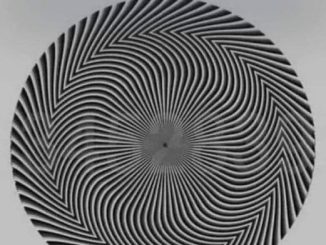In today’s fast-moving world of viral memes and personality quizzes, one optical illusion has captured the internet’s imagination: the claim that the number of circles you see determines if you’re a narcissist.
You may have paused on your feed, counted carefully, and wondered: “What does this say about me?”
But can a simple image truly reveal something as complex as narcissism?
Let’s dive deeper into this intriguing claim — and uncover what’s really going on behind the circles.
Understanding Optical Illusions: More Than Meets the Eye

Optical illusions have fascinated humans for centuries.
They happen when the information our eyes gather doesn’t match the way our brain interprets it.
In short: illusions expose the way our minds guess, interpret, and sometimes get tricked by visual information.
There are different types of illusions:
- Literal illusions (like the famous duck-rabbit drawing)
- Physiological illusions (caused by overstimulating the brain with patterns or colors)
- Cognitive illusions (where your mind’s assumptions about the world alter what you see)
That’s why illusions like the “how many circles” meme instantly grab our attention.
They remind us that seeing is not always believing.
The Circle Meme: Why It Went Viral
The formula behind its success is simple:
- Instant interaction — You can participate by just looking.
- Bold claim — “Find out if you’re a narcissist!”
- Shareability — Everyone loves testing themselves and their friends.
It feels personal, fast, and a little daring.
But is there any truth behind the claim?
Spoiler Alert: No Scientific Evidence
There’s no credible psychological research linking the number of circles you see to narcissistic traits.
Narcissism is a complex personality disorder diagnosed through careful clinical evaluation — not by counting shapes in a viral image.
Video : Brain🧠check
Real psychological tests involve:
- Extensive interviews
- Behavior observation
- Standardized personality assessments
This meme, while fun, is just that: entertainment, not science.
What Is Narcissism, Really?
We throw around the word “narcissist” a lot these days — but let’s get specific.
Clinical narcissism (Narcissistic Personality Disorder) involves:
- Grandiose self-importance
- Lack of empathy for others
- Obsession with success, beauty, or power
- Deep need for excessive admiration
- Difficulty maintaining healthy relationships
Casual narcissism, on the other hand, is the everyday self-centeredness we sometimes joke about — like posting one too many selfies.
True narcissism is rare and complex.
It’s not something that can be diagnosed by an internet picture.
Why Our Brains Love These Quick “Tests”
You might wonder: If it’s not real, why are we so obsessed with these memes?
Here’s why:
- We crave self-understanding.
We’re wired to seek identity and meaning. - We love immediate answers.
No one wants to spend years in therapy to understand themselves when a 5-second test promises instant insight. - We enjoy social bonding.
Sharing results creates conversation, laughter, and sometimes even debate.
Plus, these “tests” often tap into a psychological phenomenon called the Barnum Effect — where people believe vague, general statements are highly accurate descriptions of themselves.
How Perception Can Reflect Personality — But Only Slightly
While this meme isn’t scientific, psychology does recognize that perception can reflect tiny aspects of personality.
For example:
- People high in anxiety might spot threats faster in ambiguous images.
- People with creative personalities might see multiple interpretations where others see one.
But again — these effects are subtle.
One quick glance at a bunch of circles won’t reveal your deepest character traits.
Breaking Down the Circle Illusion: What’s Really Happening
Let’s look closely at the image:
- Some people quickly notice one big outer circle.
- Others focus on the multiple inner circles.
- The dot at the bottom-right may distract or guide perception.
What you see depends on:
- Focus and attention
- Visual processing style
- Screen size or resolution
- Lighting or even your scrolling speed
None of these factors correlate with narcissism.
They simply reflect the fascinating, flexible ways our brains work.
The Bigger Lesson: Be Wary of Instant Labels
Quick personality memes are fun, but they can also reinforce oversimplified ideas about mental health.
Labeling someone (or yourself) as “narcissistic” based on a viral post can:
- Spread misinformation
- Create unnecessary anxiety
- Promote stereotypes about serious psychological conditions
Understanding ourselves is a lifelong journey — not something that happens in a 10-second glance.
Video : Short Personality Quiz That’ll Boost Your Brain 😯
Why Narcissism Is Such a Hot Topic Today
It’s no accident that narcissism memes go viral.
We live in an age obsessed with:
- Self-image (hello, Instagram!)
- Validation (count those likes)
- Personal branding (everyone’s selling their story)
The rise of social media culture naturally raises questions about where healthy self-confidence ends and narcissism begins.
Memes like this one tap into that cultural tension — which makes them irresistible to share.
Final Thoughts: It’s All in Good Fun — But Keep Perspective
The “how many circles you see” meme is clever, funny, and engaging.
It sparks curiosity, conversation, and a little self-reflection.
But at the end of the day, it’s important to remember:
- Your worth isn’t measured by a viral illusion.
- True understanding of yourself takes time, patience, and depth.
- Quick labels rarely tell the whole story.
So enjoy the memes, have fun with your friends — but don’t let a few circles define you.
The real you is far more complex, beautiful, and fascinating than any optical trick could ever reveal. 🧠✨


